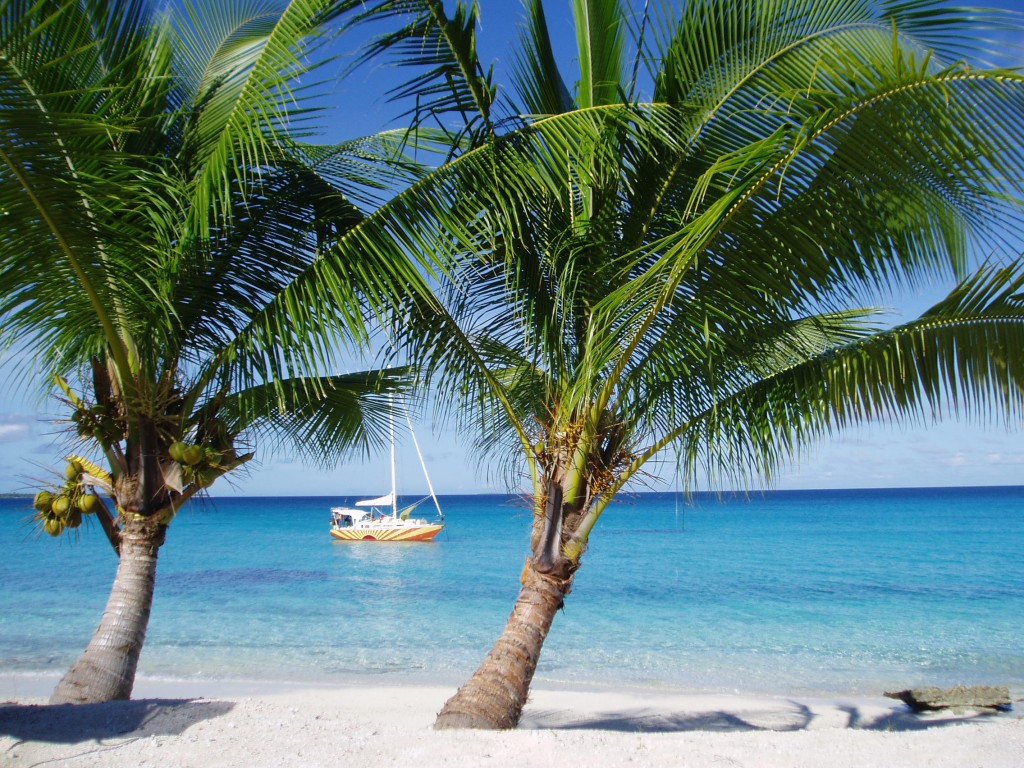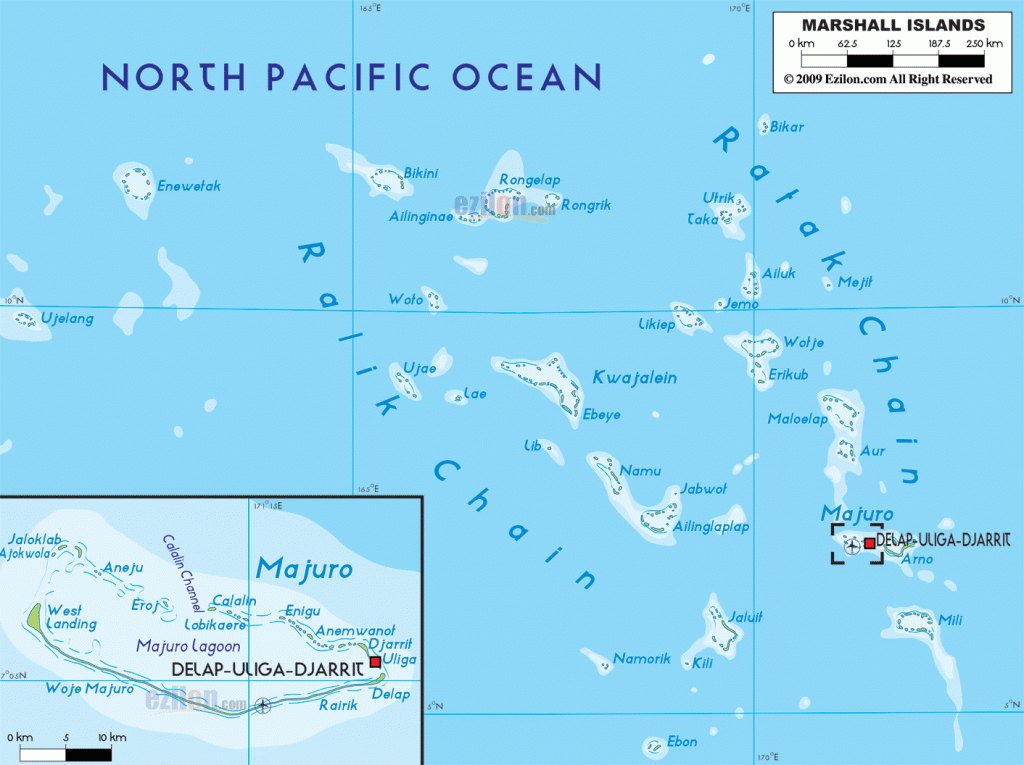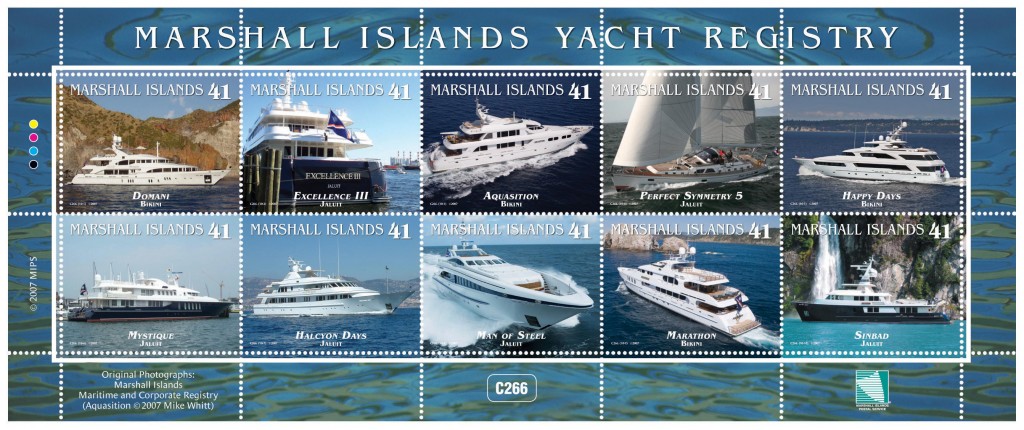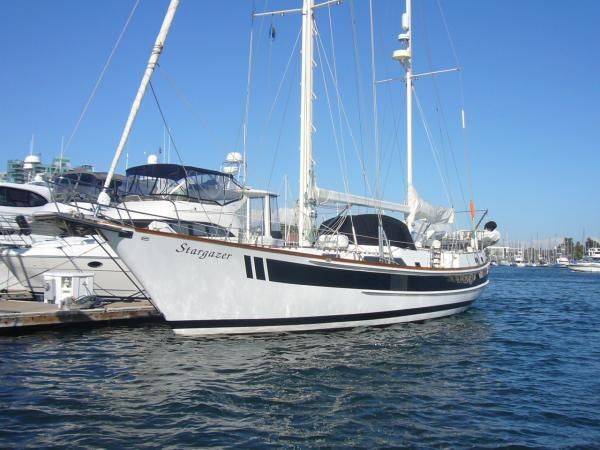The Marshall Islands Yacht Registry has gained increased recognition throughout the yachting community as a result of its more efficient registration process, which includes a yacht owner’s ability to register a private yacht under either a one-year or three-year program.
The Marshall Islands Registry is ranked as the third largest open registry in the world and private/commercial yachts comprise 24% of the Marshall Islands fleet in terms of vessel count.
With an office in Ft. Lauderdale, Florida USA, and regional offices in other major maritime cities around the world, the Marshall Islands is able to provide same-day service to the yachting community, regardless of location and time zone.
“The Marshall Islands Yacht Registry has grown substantially over the last couple of years. Yachts are coming straight out of their building yard and directly into the Registry. We look forward to continuing to provide an effective registration process, available from any IRI office, that is integral with the regulatory atmosphere regarding safety, security and environmental protection with respect to the operation of vessels in the Registry,” continued Gene Sweeney.
Marshall Islands Private Yacht Registration
The Administration considers any pleasure yacht not on charter or carrying passengers for hire, not engaged in trade or commerce, and being used solely for the pleasure or recreational purposes of its owner to be a private yacht. More specifically, to be considered a private yacht, a vessel is:
- In the case of a yacht owned by a corporate entity, one on which the persons on the yacht are employees, officers or shareholders (including beneficial owners) of the corporate entity, or their immediate family or friends; or
- In the case of a trust or other ownership arrangement, one on which the persons on board the yacht are beneficiaries under the trust or beneficial owners of the ownership arrangement, or their immediate family or friends; or
- One on which persons other than those referenced in (a) or (b) above are specifically authorized by the owner to use the yacht for specified periods of time; and in private use.
The registration of private yachts is limited to those of 12 meters or more in length. The Maritime Administrator may, however, consider waiving the minimum size limitation and other requirements for private yachts less than 12 meters in length given the necessary justification.
A Marshall Islands citizen or national or a qualified foreign maritime entity must own the vessel. The term “citizen” or “national” includes Marshall Islands corporations, limited liability companies, partnerships and associations of individuals.
To be registered as a private yacht, an owner must submit at registration a Declaration of Private Use, form MI-127, declaring that the yacht is “not” a commercial yacht or cargo vessel and will not be used for commercial purposes or gain.
The term “private use” means that the vessel is used on a private voyage or excursion, and during such use is not engaged in trade by transporting merchandise or carrying passengers for reward or remuneration (other than as a contribution to the actual cost of the vessel or its operation for the period of the voyage or excursion) or gain, and is not offered for charter or to the public for use.
Classification by an Administration recognized Classification Society is not required but is recommended, particularly for private yachts of 24 meters or more in length. For private yachts of 24 meters or more in length that are not classed, a Certificate of Survey issued by a recognized Classification Society surveyor or a surveyor authorized by the Maritime Administrator (an “Authorized Surveyor”) or a Statement of Compliance or similar document from an underwriter’s assessor retained by the yacht owner must be submitted.
In the case of private yachts of less than 24 meters in length, this survey may be carried out by an Authorized Surveyor, a recognized naval architect or yacht association, qualified boatyard personnel or an underwriter’s assessor from whom a Statement of Compliance or similar document would be obtained.
In either case, for yachts not constructed to the standards of a recognized Classification Society, verification of reasonably sufficient compliance with the Marshall Islands Safety Code of Practice for Large and Small Yachts for its intended use and a reasonable period of satisfactory operation must be provided.
A tonnage measurement must be performed and a tonnage certificate issued and presented at registration.
For private yachts 24 meters or more in length, compliance with the International Convention on Tonnage Measurement of Ships, 1969, is required. Admeasurements and certification should be performed by a recognized Classification Society surveyor or by an Authorized Surveyor.
For private yachts less than 24 meters in length: An Authorized Surveyor, naval architect, yacht association or builder may perform the admeasurements. The issuance of a national tonnage measurement certificate is optional. A simplified method of measurement provided in the National Safety Code may be used, if necessary.
An Owner may now select either Jaluit or Bikini , Republic of the Marshall Islands , as the home port for private yachts.
Proof of hull and machinery and liability coverage from an underwriter in policy form acceptable to the Maritime Administrator is required.
The Application for Private Yacht Registration, form MI-101PY, is a single page document. The registration process begins with the submission of this application and the supporting documents outlined below:
- Power of Attorney and/or Corporate Resolutions that incorporate a Power of Attorney.
- Proof of Ownership, i.e., Bill of Sale, Builder’s Certificate.
- Declaration of Private Use.
- Tonnage Measurement Certificate.
- Verification of Suitability for Intended Use: if classed, by a Certificate of Confirmation of Class issued by a Classification Society recognized by the Maritime Administrator, or if not classed, by a Certificate of Survey, Statement of Compliance or other document issued by a recognized Classification Society surveyor, an Authorized Surveyor or an underwriter’s assessor for the company that will be insuring the yacht.
- Either confirmation of Hull and Machinery and P&I coverage or Cover Note on a combined policy of insurance issued by a recognized insurance company in a form acceptable to the Maritime Administrator.
- Proof that vessel is free of liens or encumbrances.
- If the yacht is not a newbuilding and is currently documented in another country, consent from that country to the vessel’s transfer to the Marshall Islands .
All private yachts regardless of size must comply with the International Regulations for Preventing Collisions at Sea, 1972 (COLREGS ’72), as may be amended from time to time. The Maritime Administrator may, if deemed necessary, require the submission of detailed plans showing the positioning and arrangements of navigation lights for examination prior to registration.
A Marshall Islands Safety Code of Practice for Large and Small Yachts (the “National Safety Code”) has been established with the intent of providing an International Convention equivalent which addresses the special circumstances of yacht owners and operators.
The National Safety Code for Small Yachts (MI-103B) should be used as a guideline for private yachts of less than 24 meters in length. Upon owner’s request, a Marshall Islands Document of Compliance may be issued by the Maritime Administrator on the basis of a Statement of Compliance or similar document submitted by the owner indicating reasonably sufficient compliance with the National Safety Code.
The National Safety Code for Large Yachts (MI-103A) should be used as a guideline for all private yachts 24 meters and over in length. Upon an owner’s request, a National Document of Compliance may be issued by a recognized Classification Society, if classed, or by the Maritime Administrator, if not classed, based on a Certificate of Survey or Statement of Compliance submitted by the owner indicating reasonably sufficient compliance with the National Safety Code.
A National Radio Station License (application form MI-104) is required on all yachts with a radio station on board. An appropriately certified radio operator should also be on board. National safety radio communications requirements apply to all private yachts regardless of size. Guidelines to meet these requirements may be found in the National Safety Code.
Compliance with the International Convention for the Prevention of Pollution from Ships, 1973, as amended by the Protocol of 1978 (MARPOL), is required as follows:
- Annex I is applied to all yachts regardless of size unless expressly provided otherwise. All yachts are required to maintain an oil record book.
- All yachts of 400 gross tons or more are required to be issued and carry on board an International Oil Pollution Prevention Certificate (IOPPC) in accordance with Regulation 5 of Annex I.
- Annex IV is applied to all yachts certified to carry more than 10 persons on board and to all yachts of 200 gross tons or more regardless of the number of persons on board in accordance with Regulation 2.
- Annex V is applied to all yachts regardless of size unless expressly provided otherwise.
In addition, all yachts are required to meet local coastal State requirements for the control of pollution in their domestic waters that may exceed those of MARPOL.
No Minimum Safe Manning Certificate is required; however, owners should follow the guidelines provided in the National Safety Code.
Qualification as Yacht Master or equivalent is recommended on private yachts of 24 meters or more in length or 80 gross tons and above, and qualification as Engineer is also recommended on private yachts of 1200 kW main engine power and/or 500 gross tons and above. Relevant qualifications should be according to size, propulsion power, and area of operation. Guidelines are provided in the National Safety Code.
Issuance of a Private Yacht Certificate of Registry is subject to the satisfaction of documentation requirements as specified above. Although issued without an expiration date, the Private Yacht Certificate of Registry is subject to annual revalidation. The continued validity of the Private Yacht Certificate of Registry is contingent upon each of the following requirements being met by the yacht owner or operator:
- Maintaining good standing of the owning entity in the Marshall Islands ; and
- Paying tonnage taxes, and all other fees or assessments when due;
Failure to pay annual tonnage tax and renewal fees for Certificate of Registry and Radio Station License when due will result in the vessel being deleted from the Marshall Islands registry and flag.
Bills of Sale, Builders Certificates, mortgages and related financial instruments may be recorded on the public record.
Commercial Yacht Registration
To the Maritime Administration, any pleasure yacht engaged in trade, commerce, on charter or carrying passengers for hire is a commercial yacht. The registration of commercial yachts is limited to those of 24 meters or more in length. The Maritime Administrator may, however, consider waiving the minimum size limitation and other requirements for commercial yachts less than 24 meters in length given the necessary justification.
A Marshall Islands citizen or national or a qualified foreign maritime entity must own the vessel. The term “citizen” or “national” includes Marshall Islands corporations, limited liability companies, partnerships and associations of individuals.
As vessels engaged in trade, commercial yachts are subject to SOLAS, Load Line, MARPOL and STCW Convention requirements. Furthermore, under SOLAS, any vessel carrying more than 12 passengers for hire on board is considered to be a passenger vessel, subject to the passenger ship rules, regardless of tonnage and irrespective of whether or not it is being presented as a commercial or private pleasure yacht and as such would not be considered for registration as a yacht, but as a passenger ship. Since SOLAS defines a cargo ship as any ship within the Convention that is not a passenger ship, a commercial yacht of 500 or more gross tons that carries 12 passengers or less for hire must be classed and certified as a cargo ship under the Convention.
The Administration prefers that commercial yachts of 24 meters or more in length and up to 500 gross tons be classed by an organization recognized by the Maritime Administrator in order to satisfy the suitability requirements for registration. Submission of a Certificate of Confirmation of Classification will satisfy this requirement.
For those commercial yachts that are not classed, the National Safety Code provides guidelines for the establishment of suitability for intended service. In such cases, a Certificate of Survey issued by a surveyor authorized by the Maritime Administrator (“Authorized Surveyor”) would be required.
Compliance with the 1969 Tonnage Convention and the issuance of a 1969 Tonnage Certificate is required for commercial yachts. A recognized Classification Society surveyor or an Authorized Surveyor may perform the admeasurements and certification.
An Owner may select either Jaluit or Bikini, Republic of the Marshall Islands, as the home port for commercial yachts.
Proof of liability coverage from a P&I club or other underwriter in policy form acceptable to the Maritime Administrator is required.
Commercial yachts are registered under the laws of the Republic in the same manner as any other vessel engaged in trade, see full details.
The Marshall Islands requires all commercial yachts regardless of size to comply with the International Regulations for Preventing Collisions at Sea, 1972 (COLREGS ’72), as may be amended from time to time. The commercial yacht’s Classification Society or an Authorized Surveyor must verify COLREGS ’72 compliance.
A Marshall Islands Safety Code of Practice for Large and Small Yachts (the “National Safety Code”) has been established with the intent of providing an International Convention equivalent which addresses the special circumstances of yacht owners and operators.
Commercial yachts that are 24 meters or more in length and up to 500 gross tons are required to meet the standards of the National Safety Code for Large Yachts (MI-103A) and are issued a Marshall Islands Document of Compliance.
Commercial yachts of less than 24 meters in length, if accepted for registration, must meet the requirements of the National Safety Code for Small Yachts (MI-103B) and will also be issued a Marshall Islands Document of Compliance.
In October 2008, International Registries, Inc. (IRI), the Marshall Islands Maritime and Corporate Administrators, announced the introduction of an updated Commercial Yacht Code (CYC). The CYC was updated in response to the yachting industry’s need for easily understandable, user-friendly regulations that readily addresses current issues relevant to the yacht owner/operator. The changes also provide a practical approach to evolving safety and technical issues. The CYC replaces the Marshall Islands Safety Codes of Practice for Large Yachts MI-103A and Small Yachts MI-103B. Specific changes include:
- Revised manning requirements – Annex 4, including the introduction of a new Master of Yachts, up to 350 gross tons license;
- Acceptance of existing MCA LY2-certified yacht for transfer to the Marshall Islands flag; and
- Updated general guidance to privately registered yachts and streamlined procedures for owners wishing to utilize the Marshall Islands’ annual 84 day chartering privilege for private yachts exceeding 18 meters in length.
While the Registry overall is ranked as the fourth largest in the world, private and commercial yachts comprise 23% of the total number of vessels in the fleet. The number of yachts registered in the Marshall Islands has grown at an average rate of 90% over the past five years. Given the continual growth of the Yacht Registry, a dedicated technical group has been established which not only includes the Yacht Registry team in Fort Lauderdale but technical experts in other offices in Europe and the United States.
SOLAS ’74: Compliance with the applicable provisions of the International Convention for the Safety of Life at Sea, 1974, and its Protocol of 1978, as may be amended from time to time (SOLAS ’74), is required as follows:
- Commercial yachts of 500 gross tons or more on international voyages carrying 12 passengers or less for hire must be classed and meet SOLAS cargo ship requirements.
- Commercial yachts of any gross tonnage carrying more than 12 passengers for hire on an international voyage will be considered passenger vessels that must be classed as such and must meet SOLAS passenger ship requirements.
- Appropriate SOLAS Convention certificates must be issued by an organization recognized by the Maritime Administrator.
Radio Station License: A National Radio Station License (application form MI-104) is required on all yachts with a radio station on board. An appropriately certified radio operator must also be on board. A SOLAS Ch. IV Convention Safety Radio Certificate is required for all commercial yachts of 300 gross tons or over which will entail GMDSS compliance. National requirements apply to yachts of less than 300 gross tons. Guidelines to meet these requirements are provided in the National Safety Code.
Compliance with the International Convention for the Prevention of Pollution from Ships, 1973, as amended by the Protocol of 1978 (MARPOL), is required as follows:
- Annex I is applied to all yachts regardless of size unless expressly provided otherwise. All yachts are required to maintain an oil record book.
- All yachts of 400 gross tons or more are required to be issued and carry on board an International Oil Pollution Prevention Certificate (IOPPC) in accordance with Regulation 5 of Annex I.
- Annex IV is applied to all yachts certified to carry more than 10 persons on board and to all yachts of 200 gross tons or more regardless of the number of persons on board in accordance with Regulation 2.
- Annex V is applied to all yachts regardless of size unless expressly provided otherwise.
In addition, all yachts are required to meet local coastal state requirements for the control of pollution in their domestic waters that may exceed those of MARPOL.
Compliance with the International Load Line Convention, 1966 (ILLC ’66), is mandatory for all new commercial yachts of 24 meters or more in length or existing commercial yachts of 150 gross tons or more as defined in accordance with ILLC ’66. The National Safety Code provides guidelines for the establishment and application of this load line requirement.
Minimum safe manning levels are established for every commercial yacht 80 gross tons and over. Levels are determined by yacht size and propulsion power on either long or short international voyages and operating distance limitations from a port of safe haven. Minimum guidelines are provided in the National Safety Code.
Officer and crew certification shall be in accordance with Marshall Islands Maritime Regulations and STCW 95 requirements. Guidelines are provided in the National Safety Code.
Issuance of a Commercial Yacht Certificate of Registry is subject to the satisfaction of documentation requirements outlined above.
Although issued without an expiration date, the Commercial Yacht Permanent Certificate of Registry is subject to annual revalidation. The continued validity of the Commercial Yacht Permanent Certificate of Registry is contingent upon the following requirements being met by the yacht owner or operator:
- Maintaining good standing of the owning entity in the Marshall Islands ;
- Paying annual tonnage taxes and all other fees or assessments when due;
- Retaining current classification status and valid National Document of Compliance;
- Submitting to the Maritime Administrator each year a satisfactory Safety Inspection Report, Certificate of Survey or Statement of Compliance that must be received by the anniversary date of initial issue of the Commercial Yacht Permanent Certificate of Registry.
Yachts of 400 gross tons and above are subject to an annual safety inspection performed by the Office of the Maritime Administrator on or before the anniversary date of the issuance of the Commercial Yacht Permanent Certificate of Registry. A recognized Classification Society or an Authorized Surveyor must also carry out annual surveys. Completion of annual safety inspections and surveys are conditions for the continued validity of the Commercial Yacht Permanent Certificate of Registry.
Yachts under 400 gross tons must also carry out an annual safety inspection as a condition for the continued validity of the Commercial Yacht Permanent Certificate of Registry. The owner/operator may arrange to have the inspection performed by an Authorized Surveyor, or a self-assessment scheme approved by the Maritime Administrator. Either method must result in the submission by the owner each year of a Statement of Compliance to the Maritime Administrator.
Bills of Sale, Builder’s Certificates, mortgages and related financial instruments may be recorded on the public record.


















